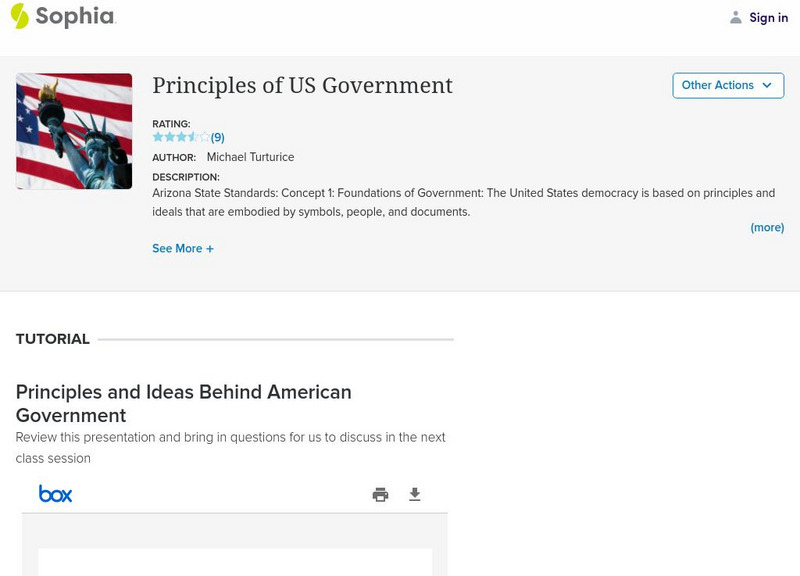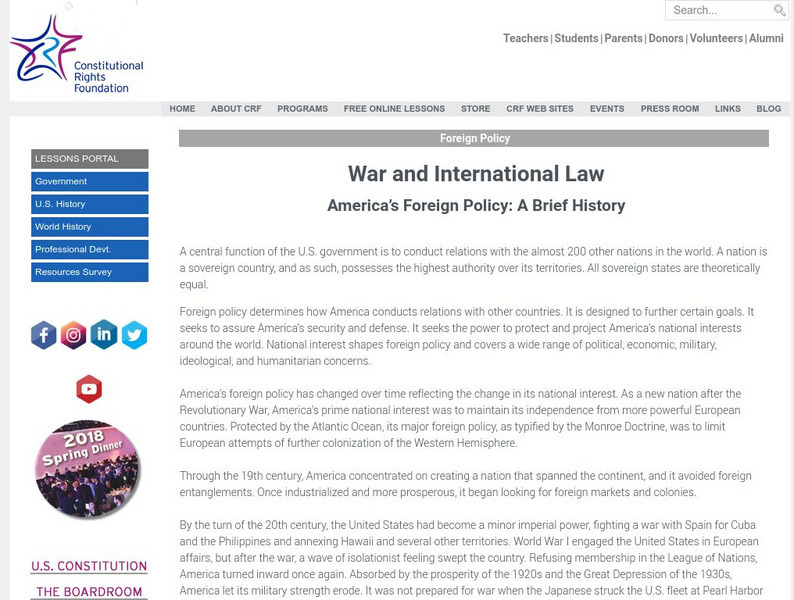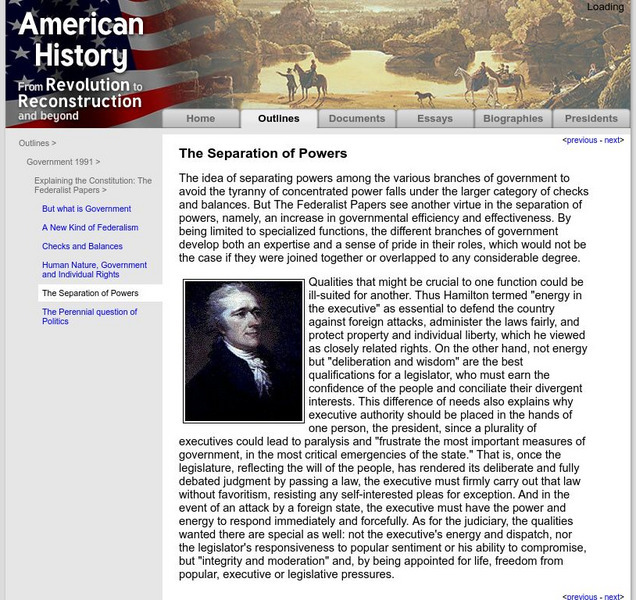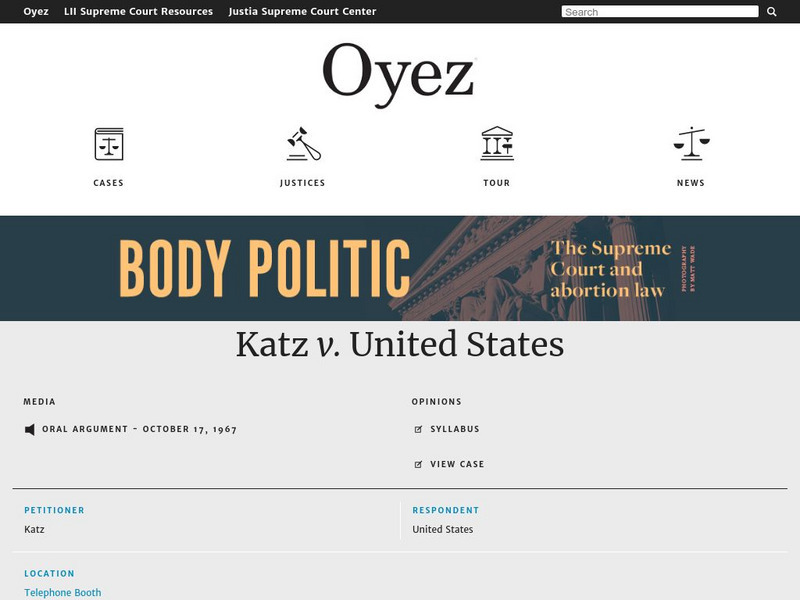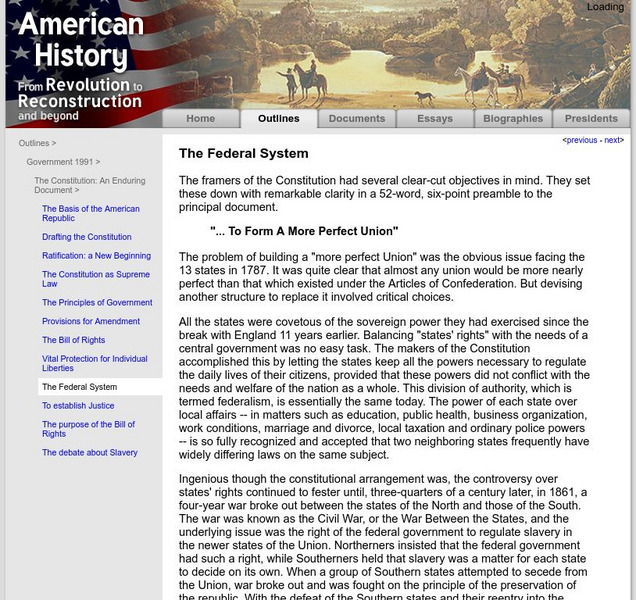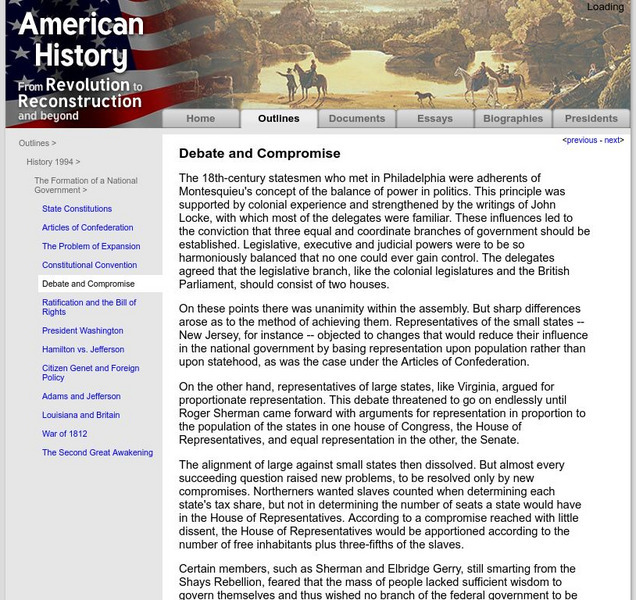Hi, what do you want to do?
iCivics
I Civics: Changing the Constitution
America's constitutional government has changed over time as a result of amendments to the U.S. Constitution, Supreme Court decisions, legislation, and other practices. Students will use the seven basic principles found in our government...
University of Groningen
American History: Outlines: The Principles of Government
Outline of the man principles of U.S. government under the constitution.
Stephen Byrne
History for Kids: United States Constitution
History for Kids provides an overview geared toward elementary age students of the history of the United States Constitution. Includes links to resources for teachers.
Bill of Rights Institute
Bill of Rights Institute: Founding Principles
Below, you will find suggested definitions of each principle. Click here to read the words of James Madison, a primary contributor to the Constitution, and other Founders on these principles.
Other
Touro Law Center: William Marbury vs. James Madison
Transcript of the landmark court case that established the constitutional principle of judicial review. Judicial review is the concept that the federal judiciary has final power as to whether an act of the Congress or the Executive...
Sophia Learning
Sophia: Principles of u.s. Government
Tutorial presents an introduction to the principles of the United States democratic government highlighting the differences and similarities between Roman and U.S. governments.
Other
Freedom Forum: Lesson Plans for the First Amendment
These lessons address constitutional principles and contemporary issues involving the First Amendment. They intend to have explore how freedoms began and how they operate in today's world. Students will discuss just how far individual...
Tom Richey
Tom richey.net: The u.s. Constitution: Framing, Principles and Ratification [Ppt]
Presents key ideas for examining how the Articles of Confederation were replaced with the Constitution and the compromises that were reached during debates.
Other
Institute for American Liberty: The First Principles of the Constitution [Pdf]
This article contains information about the principles used to create the Constitution of the United States.
Constitutional Rights Foundation
Constitutional Rights Foundation: War and International Law: America's Foreign Policy: A Brief History
Explore the history of foreign policy in the United States from the nineteenth century through to the present. Identify what values and principles have helped its formation over the years. Includes discussion questions.
Other
Yes for Liberty: Youth Educational Scholarship Constitution Bee
This organization seeks to educate youth about the Constitution and its founding principles. Each year they hold a Constitution Bee. Study materials and a quiz for learning about the Constitution are provided on the site, as well as the...
University of Groningen
American History: Outlines: The Separation of Powers
Informative discussion of the ideas behind the Constitutional principle of Separation of Powers.
Other
Constitutional Principle: Charles Pinckney and Separation of Church and State
A short article describing Pinckney's views on religion and the role of the state. Excerpted from a book by Anson Phelps Stokes.
Illinois Institute of Technology
The Oyez Project: Katz v. United States
Katz v. United States altered the meaning of the 4th Amendment, the right to search and seizure, appealing his case in 1967 regarding the investigator's use of electronic surveillance. Oyez features the facts and recordings from the...
University of Groningen
American History: Outlines: Checks and Balances
Overview of the principle of checks and balances proposed in the Federalist Papers.
Digital History
Digital History: American Revolution: Introduction
The American Revolution included so much more than just the War for Independence. Read about why it was the first modern revolution and discover the principles that the American revolutionaries were fighting for.
Other
American Revolution: Those Glorious "Principles of 1776": Confederate Perspective
This site explains the Southern perspective on the voluntary union of states and the justification for the South seceding from the Union.
Center For Civic Education
Center for Civic Education: What Is Authority? [Pdf]
This in-depth lesson teaches the meaning of authority, the benefits and drawbacks of someone having authority over another person, where authority comes from and who uses it, how it helps to solve problems, and how leaders are chosen....
American Public Media
American Radio Works: The Southern Manifesto
The Southern Manifesto, written in opposition to the racial integration of public places and condemning the Supreme Court's 1954 school desegregation decision, was signed by 101 congressmen from the Deep South.
University of Groningen
American History: Outlines: The Federal System
Outline of the principles embedded in a Federal System of government attempting to balance states' rights with the need for a central government.
Encyclopedia Britannica
Encyclopedia Britannica: Declaration of the Rights of Man and of the Citizen
Provided here are the principles and sources of France's Declaration of the Rights of Man and of the Citizen, a basic charter of human liberty that later led to the French Revolution and the French Constitution.
University of Groningen
American History: Outlines: Debate and Compromise
The 18th-century statesmen who met in Philadelphia were adherents of Montesquieu's concept of the balance of power in politics. This principle was supported by colonial experience and strengthened by the writings of John Locke, with...
University of Groningen
American History: Outlines: Human Nature, Government and Individual Rights
Overview discussion of the views held by Madison and Hamilton that people, in general, need to have written into the law certain checks and balances to guard against abuse of power, protect individual rights and encompass a pluralistic...
Other
A Republic, if You Can Keep It
An essay by U.S. Congressional Representative Ron Paul of Texas on the state of the American republic delivered at the dawn of the twenty-first century. He argues for the strong separation of powers among the three branches of government...









